The third Global Summit of Pest Management Services for Public Health & Food Safety, which ran from 4 to 6 June, attracted its biggest ever audience. A total of 300 attendees made their way to the Portuguese resort of Cascais, just 25 minutes around the coast from the capital, Lisbon. There were delegates from five continents Europe, Asia, Australasia, Africa and the Americas. In total 34 countries were represented.
Noteable participation included 37 from the Pacific Rim/Asia (including a delegation of 20 from China), 33 from North America and six from South America. 188 delegates came from Europe, including 33 from France, 42 from the host country, Portugal and 39 from Spain.
No cabbages here
Opening the Summit which was jointly organised by the Confederation of European Pest Management Associations (CEPA) and the USA’s National Pest Management Association (NPMA), CEPA president, Henry Mott spoke about the need for change in our industry. He identified three types of people: revolutionists, evolutionists and cabbages. He said that we need revolutionary ideas but we also need to evolve in our practices. “What we don’t need are the cabbages – the people who always say a new idea will never work, the people who always highlight the problems, not the opportunities. They are everywhere, in the board room and in the field. They must be avoided at all costs,” he said. “I am sure that all of you in this room are the revolutionaries of the pest control world. There are no cabbages here!”
Previous events – in New York in 2017 and in France in 2015 – have focused on pest management and food safety but this time there was much more emphasis on public health and, in particular, mosquitoes and the vector-borne diseases they carry. Not that food safety was ignored. Ferenc Varga from Nestle and Justyna Kostarczyk from the Metro Group, an international wholesale ‘cash and carry’ business based in Germany, kicked off proceedings. Both presentations examined how their respective companies manage their businesses with the aim of achieving zero-pests. Both advocated strong relationships between PMPs and their food industry customers as key and both would welcome more consistent global pest management servicing standards to support food safety.
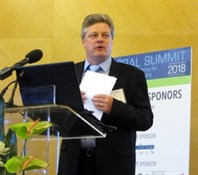 CEPA president, the UK’s Henry Mott, opened the summit CEPA president, the UK’s Henry Mott, opened the summit |
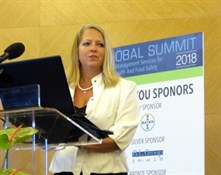 NPMA’s chief executive Dominique Stumpf welcomed delegates |
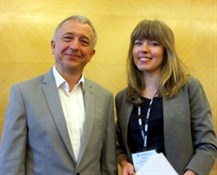 Nestle’s Ferenc Varga with Justyna Kostarczyk from the Metro Group |
Mosquitoes high on the public health agenda
Among the many speakers on mosquitoes and the threat they pose to human life was Fedros Okumu from the Ifakara Health Institute in Tanzania. He asked a fundamental question: How innovative is malaria mosquito control? The answer – not very. Bed nets have been used for as long as humans have lived in closed dwellings in Africa and they are still the best defense. Nets are good but new tools are needed. His institute is working on many simple innovative techniques including, for example, insecticide impregnated sandals to protect people when they are not under bed nets. The prototypes have had great results but investment is needed. “We are looking for partners to invest,” he said.
With an eye towards innovation Ruben Bueno from Lokimica Laboratories looked at the potential for unmanned vehicles – drones – for mosquito mapping and control. Alfie Treleven, Sprague Pest Solutions, ran through the way his company uses technology in its training and motivational programs as well as for remote sensing device management, paperless reporting and to monitor overall performance. The company has its own social sharing network for employees to add field notes and share problems and solutions. “Millenials like to share on social media and record and upload podcasts, you have to allow them time to do it,” he said.
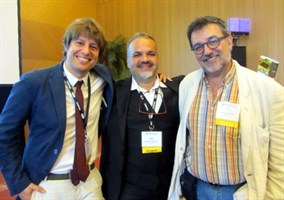 Shared interest in mosquitos. L-R Ruben Bueno, Lokimica, Fabio Castelo, Ministry of Health Brazil and Roger Eritja, University of Barcelona |
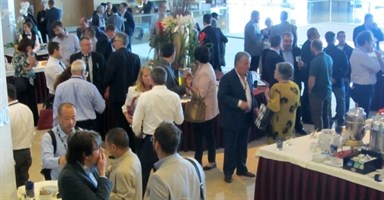 There was plenty of opportunity for networking during the coffee breaks and over lunch |
Are we ready for change?
The session looking at how the industry needs to prepare for change included a paper by David Andreu from Goldservice, Spain. He highlighted the paradox that general public customers want to communicate in an impersonal way (email, text social media) at a time to suit themselves and yet they are demanding ever more personalised service. Commercial clients on the other hand fall into two groups. One group wants a low cost standardised automated service whereas the other wants an increasingly personalised service.
Dennis Jenkins from ABC Pest Control in Texas agreed that customers want service now. He said: “Amazon has taught people they should expect it now. Uberisation of pest control means call today, get serviced today, every time. Five minutes early is on time, on time is late and anything else is unacceptable.”
The political dimension
The final session of the first day took a much wider perspective. It examined the need for a harmonised global approach to pest management standards looking at the politics and outside pressures on our industry and introducing the concept of soft legislation through public private partnerships. Robert Madelin now a consultant, but formerly the Director General of the European Commission’s Consumer & Health Directorate, explored the ways in which the pest management industry can work with allies, partners and sponsors to ensure it is not regulated out of business. His paper looked at the opportunities via such initiatives as the Global Sustainable Development Goals, the industry has to be accepted as an ethical business and therefore subjected to a light regulatory touch.
On day two, as well as celebrating World Pest Day, there was a fascinating insight into the likely impact of climate change from Dr Roberto Pereira from the University of Florida. The bad news is (or is it good for the pest management industry?) insect pests are largely going to be winners as temperatures rise and weather related disasters increase.
Around the world in 80 minutes
The final session went around the world in 80 minutes with representatives from South America, North America, Africa, Australia, China and Europe giving a summary of the challenges and opportunities they face.
This revealed some similarities such as the average number of employees in a pest management servicing company in South America is just 5 – and that’s very similar to Europe. The regulatory framework however is much more fragmented with each country in South America having its own regulation and much of this being very old. Training also varies but every company must have a university educated technical director. Whilst this sounds excellent the degree held is not specified. Only around 25% of companies are members of a trade association. This contrasts with Australia, where 85% are members. The Australian industry also works to a number of recognised Codes of Practice and customers are demanding an ever more professionalised service.
The US market is probably the most developed with great strides having been made in the last 20 years resulting in the industry being recognise as providing a professional service and more people abandoning the DIY approach to appoint a servicing professional. In Europe the production of the European Standard and the audited CEPA certified system is gathering pace and now includes 456 companies. Bertrand Montmoreau pointed out that CEPA certified is open to all companies – not just those that operate in Europe.
The African and Chinese markets are both fast growing but face a number of challenges not least the low barrier to entry and, more especially in Africa, the complete lack of policing.
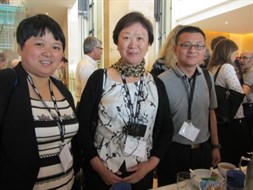 Three of the 20 strong Chinese contingent. Left to right: Yuhua Han, Fang Zhang and Xianfang Chen |
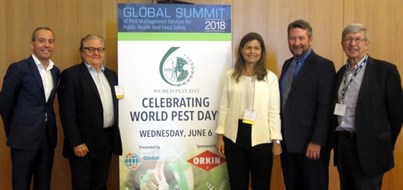 Around the world in 80 minutes. From left: Paulo Coelho (Portugal), John Adams (Australia), Laura Krell (Uruguay), Dennis Jenkins (USA) and Bertrand Montmoreau (France) |
Sponsors recognised
The Global Summit was jointly organised by the CEPA and the NPMA with generous sponsorship from key sponsors: Bayer; silver sponsors: the BL Group and bronze sponsors: Babolna Bio, Edialux, IPM Square, Mylva and Plastdiversity.
In a social and environmentally responsible move, there were no giveaways for delegates. Instead a donation was made on behalf of each attendee to UNICEF to support the thousands of babies with congenital defects caused by the Zika virus.

